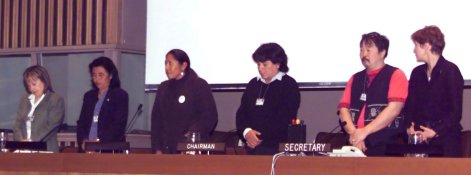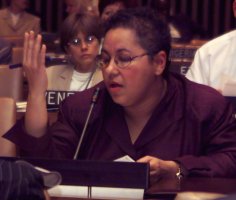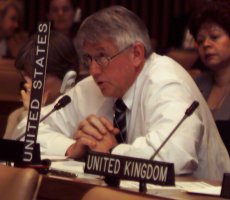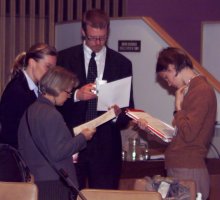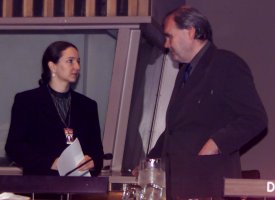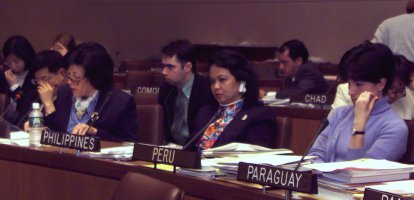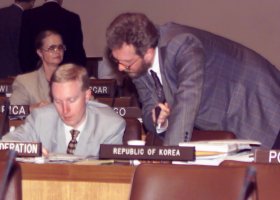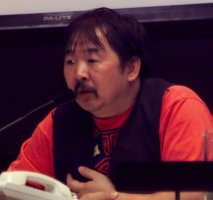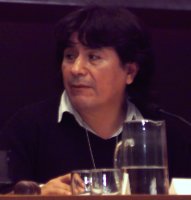| |
|
Drafting Group II on Financial Resources and
Mechanisms and on Economic Growth, Trade and Investment
|
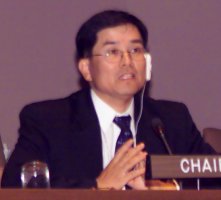
Photo:
Chair Choi
Seok-young (Republic of Korea) |
In
the afternoon, Drafting Group II reviewed text distributed by
Chair Seok-young on Finance, Trade, Investment, and Economic Growth.
|
|
On
priority areas for future work,
Guyana (right) for the G-77/China, said
the concept of good governance was subjective and preferred reference
to "transparent, effective and accountable". On globalization,
the G-77/China's proposed text on the need to "reform" the
international financial system, and manage the "financial" crises,
was bracketed." The G-77/China suggested that strengthening
existing financial mechanisms should be placed before exploration
of new ones, and requested clarification on the meaning of institutional
aspects.
|
|
|
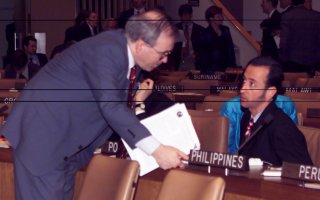
Photo:
Canada (left) with Portugal (right).
|
Regarding
the document as a whole, Australia requested a more balanced document
acknowledging the potential environmental benefits of economic
growth. The EU emphasized the need to "break the linkage"
between economic growth and environmental degradation.
|
|
On
promoting an enabling environment for mobilizing resources, the
EU, supported by the US, Norway and Japan, argued in favor
of retaining reference to "good" governance, rather than "transparent,
effective and accountable" governance. Both phrases remain bracketed.
|
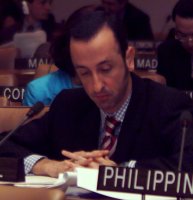
Photo:
Portugal,
on behalf of the EU
|
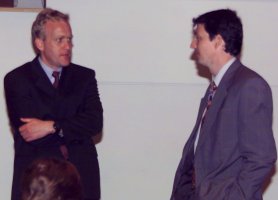
Photo: ENB writer
Jon Hanks (left) with the delegate from South Africa
(right). |
On capital
flight, the G-77/China and the US suggested deleting text on capital
repatriation. The Russian Federation and South Africa opposed.
The text remains bracketed.
|
|
The United States supported a proposal by New Zealand calling
for elimination of trade-distorting and environmentally harmful
subsidies, instead of a phasing out of such subsidies. He also questioned
inclusion of language on pricing policies within a free market framework.
|
|
|
|
Delegates
discuss a paper on trade tabled by the NGO Caucus on trade
|
|
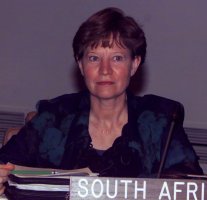
Marba
Visagie, South Africa
|
|
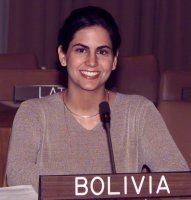
Clemencia
Pacheco, Bolivia |
|
Drafting Group on Land and Agriculture
The
group began negotiations on the paper on land management, but suspended
negotiations to allow time for the G-77/China to further consult
on the text.
|
|
Chair
Patrick McDonnell,
Ireland, discusses the status of negotiations with ENB writer Tonya
Barnes. The group considered the first revision of the draft on
integrated planning and management of land resources.
|
|
|
Portugal
(above left), on behalf of the European Union In the draft introduction,
the G-77/China proposed text on the need for countries to
ensure access to land, water and other natural resources. The EU
and the US supported inclusion of text on equal access to
land. The G-77/China opposed language on participatory, transparent
and accountable decision-making, conflict resolution, an enabling
environment and good governance. The EU noted that this was
agreed language from the International Conference on Population
and Development.
|
|
|
The
Russian Federation discussed the text before the meeting begins
|
|
Drafting Group III on Preparations for Rio+10, the outcome
of the Intergovernmental Forum on Forests and other matters
The
drafting group commented on a paper circulated by the G-77/China
outlining recommendations for Rio+10. The paper highlights the following
points: (see daily ENB for country reactions and comments)
- that Agenda
21 not be renegotiated and that the focus should be on implementation
of Agenda 21
- early and
effective preparations at all levels to ensure high quality input
to the review process
- preparations
should commence at the national level after CSD-8 and at the international
level in January 2001
- governments
should undertake national review processes
- that the
GA at its 55th session decide that the 2002 review should be held
at the summit level and in a developing country
- that the
CSD be transformed into an open-ended committee to review implementation
of Agenda 21
- that the
preparations be transparent and provide for effective implementation
- that CSD-9
include a segment entitled "Review of progress made in the
preparation for Rio+10 to be examined by open-ended CSD"
- establishment
of a trust fund to ensure effective participation of developing
countries
- 55th GA
should decide on agenda, timing, venue and other matters related
the 2002 review
|
|
Day of Indigenous People
This
panel addressed traditional knowledge and the following questions:
What is the link with Article 8j of the Convention on Biodiversity?
Wy is traditional knowledge important for sustainable development?
Who are the decision makers and which are the conditions posed?
What is the link between Inidgenous People land rights and traditional
knowledge?
|
|
Pavel
Suliandziga,
Vice-President, Russian Association of IP of the North, discussed
indigenous people and the right to land Indigenous people and the
right to land. He said the indigenous population has been declining
in the last 30 years and the average lifespan is 46 years. He said
the new Russian constitution recognizes the rights of indigenous
people and in 1999, new law was enacted defending traditional lifestyles
and right to land. But some laws took the land from them, and TNCs
are now taking land and moving people. For example, any land desired
by companies was no longer considered indigenous land. He's not
sure if his nation will survive in the future, but on the positive
side, he said the younger generation is more politically active,
organizing and lobbying efforts are stronger, and there is more
international support.
|
|
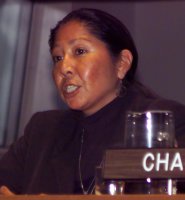 |
Debra
Harry,
IP Council on Biocolonialism (United States), discussed bioprospecting
and biopiracy. She said the centers of biodiversity are concentrated
in indigenous peoples' lands, with flow of resources to the North,
including in the form of seeds, medicines, knowledge, and human DNA.
She said the benefits of bioprospecting are not focused to indigenous
people. She said indigenous peoples' worldview is different than that
of Western people, which leads to big problems with concepts of private
property, particularly with respect to Indigenous property rights,
lifeforms being privatized, and treated and patented like a new invention.
She highlighted corporate monopolies over basic needs-food, health.
She said a lot of research is publicly funded but then privatized.
She said gene banking is not the solution and that genetic resources
are dynamic, not static. She emphasized the link between cultural
and biological diversity. |
Stella
Tamang, Nepal Tamang Women Ghedung, Nepal (right) discussed
the
Tamal peoples and knowledge and sustainable development with a
special focus on women. She said there are about
60 different indigenous groups in Nepal and that current government
programs are counterproductive and actually harmful to women.
|
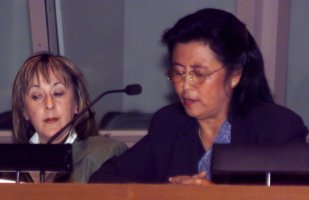 |
|
Violet
Ford, Policy
Advisor with INUIT Tapirisat, Canada, (above left) discussed
traditional ecological knowledge, using examples from the Hudson
Bay, and discussed traditional ecological knowledge and the Convention
of Biodiversity. She said traditional knowledge is a process that
cannot be separated from culture. She highlighted the Hudson Bay
area and said a recent study of the region's changing ecology showed
that ocean currents are weakening in the eastern Hudson Bay, partially
from hydropower. She said seasonal ice cover (1920-1970) has changed
markedly form hydropower and climate change. She said traditional
ecological knowledge is a tool to measure how the environment is
changing. She cited CBD Article 8J referring to indigenous knowledge
and said it is importance that indigenous people are part of the
implementation of the CBD.
|
|
Alejandro
Argumendo,
Indigenous Peoples' Biodiversity Network (IPBN), Peru, moderated
the panel discussion
|
|

 ENB
Summary of Ad Hoc Open-Ended Intergovernmental Group of Experts on Energy
and Sustainable Development ENB
Summary of Ad Hoc Open-Ended Intergovernmental Group of Experts on Energy
and Sustainable Development
 CSD-8
Intersessionals CSD-8
Intersessionals
 Linkages
CSD page Linkages
CSD page
 UN
- CSD website with official
documents UN
- CSD website with official
documents
 ENB's
"Introduction to CSD" ENB's
"Introduction to CSD"

|


